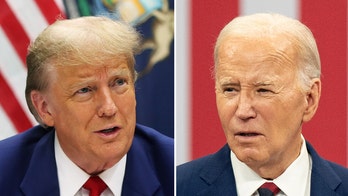
A plane flies over a British Petroleum gas station at Heathrow in London Feb. 2. (Reuters Photo)
The sudden pullout of three corporate giants from a leading alliance of businesses and environmental groups could be the death knell for climate change legislation languishing on Capitol Hill.
ConocoPhillips, BP America and Caterpillar's announced Tuesday they will pull out of the U.S. Climate Action Partnership, citing complaints that the bills now in Congress are unfair to American industry.
BP spokesman Ronnie Chappell said Tuesday's announcements are not a statement on the likelihood that climate change legislation will fail.
"I would never speculate as to what would happen with a pending piece of legislation," Chappell said.
But he said the bills on the table no longer "conform" with what USCAP envisioned for a climate change bill. He said the legislation -- including one bill that passed the House but is stalled in the Senate -- does not provide adequate protections to U.S. refineries.
If any bills are passed, they will result in more oil imports, the closure of U.S. refineries and the loss of U.S. jobs. Plus he said it's too hard on the transportation sector.
"We do not believe that the bills now pending in Congress conform to the USCAP blueprint, in that a disproportionate share of the emissions reductions and disproportionate share of the cost fall on the transportation sector and on transportation consumers and motorists," he said.
Both BP America and Caterpillar were founding members of the group.
ConocoPhillips CEO Jim Mulva also said in a statement that the House and Senate bills "disadvantaged the transportation sector and its consumers" and "unfairly penalized" domestic refineries that would have to face international competition on an unbalanced playing field.
"We believe greater attention and resources need to be dedicated to reversing these missed opportunities, and our actions today are part of that effort," he said.
The companies described their withdrawal from the group as a way to advocate for climate change legislation in other ways.
"Our position on the need for comprehensive climate change legislation has not changed," Chappell said. "We can be a more effective voice in the climate change debate if we participate as BP and not as part of a larger organization. ... We will still be very active in the climate change discussions and we will still be advocating for legislation that conforms to the USCAP blueprint."
USCAP released a brief statement Tuesday announcing that the member companies were leaving the organization. The group said the companies "provided invaluable assistance, expertise and significant commitments of time and resources" in pushing for a major climate bill.
The group reiterated its view that Congress should act on a climate bill this year.
"We believe that U.S. action on energy and climate legislation in 2010 will preserve and create American jobs, secure our energy future and generate new investment in the global clean energy economy," the statement said.
The statement noted that while three companies were leaving, others have recently joined and USCAP "expects to add new members in the coming months."
The push for climate change legislation has been hampered by more than just concern over its impact on the U.S. economy. The record snowfall this year in Washington, D.C., and other areas of the country has fueled skeptics who see the snow-covered capital as evidence that global warming is a myth, though scientists argue that temperatures have risen over the long term and that extreme weather -- even snow -- can be a symptom of climate change.
The U.N. Climate Change Conference in Copenhagen in December ended with a non-binding agreement. And that was preceded by controversy over leaked e-mails from a British climate research center that appeared to show scientists discussing ways to obscure certain climate data.
Add to that Republican Scott Brown's election to the U.S. Senate from Massachusetts in January -- a win that broke the Democrats' 60-vote filibuster-proof majority.
The conservative Competitive Enterprise Institute seized on the departure of the three companies from USCAP as a sign that "cap-and-trade legislation is dead in the U.S. Congress and that global warming alarmism is collapsing rapidly."
FoxNews.com's Judson Berger contributed to this report.




